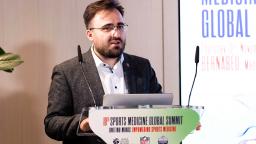Young Players Are Vulnerable – They Need Our Support
Young Players Are Vulnerable – They Need Our Support

When a football club releases its young players, it turns out the light on a childhood dream. At the training ground, life goes on, new recruits arrive, and everyone prepares for the next game. For the youngsters who sacrificed years of schooling for a shot at success, an entire world disappears in a second. Part of a team yesterday, they find themselves alone and forgotten today. They still have their lives ahead of them but the things they need most – practical advice and emotional support to help them find their feet – are exactly what’s missing.
I was nineteen when an injury ended my career. It took me a while to understand just how young I was. Through my 20s I struggled with the loneliness and despair that haunt so many youngsters. Like them, I sometimes felt I couldn’t go on. But I’m one of the lucky ones. Thanks to an internship and then a secure and fulfilling job, I managed to build a new life. And then I began to look deeper into the sport I had loved and lost, and think about what we could do better. In 2018, I launched Certified Sports with a simple mission: to champion the overlooked and give a voice to the underrated.
Today, across my country (England), around 1.5 million youngsters are playing organised football. At the highest professional level, 98% of those still playing at ages 18-to-21 will be released early by their club. But the situation is the same and often even worse in many other playing markets. Most have neither the qualifications nor the skills to make a fresh start. What happens to these youngsters, and what is the collective responsibility of the football industry to help them? Do we even know what the safety standards are across playing markets and academy systems in Europe or beyond?
he good news is that we’re not starting from nothing: some industry actors have understood that young footballers need protection from bullying, harassment and sexual abuse. When the FA introduced the Elite Player Performance Plan more than a decade ago, it asked the top clubs to take charge of young players’ welfare and social development. It created the role of a ‘safeguarding officer’, who oversees the mental health and wellbeing of academy players. The PFA has also launched the Youth Advisory Service to help support players and their families with numerous issues arising across the academy environment.
These first steps were welcome but they’ve avoided the hardest question: how can the industry prepare young players for a life after football, and give them the emotional support they need? I’ve taken the lessons from my own experience to set out a new approach. It focuses on three priorities: a safer workplace, a proper system of aftercare, and fairer working conditions for everyday life.
Safety begins with a place to talk. In a world of relentless competition, where everyone’s fighting for their shirt, who can young players turn to? When they’re worried and anxious, how can they confide in a coaching staff focused on success? The truth is: clubs cannot police themselves. Players need independent support, from trained professionals whose job is to protect them from harm, both physical and psychological. Given time and space, these professionals can begin to change a culture, making it easier for young people to share problems and seek advice.
Visualizza questo post su Instagram
Then comes the critical question of aftercare: how to help players let go of the only life they’ve ever known, and start afresh. The suicides of Joel Darlington, Josh Lyons and Jeremy Wisten tells us that we must do better, and soon. Young players need two things above all: practical advice and emotional support. Here again, professional help can make the difference. Experienced career advisors should guide young players, walk them through their options in education, training, and employment, and encourage them to take their first step. Other parts of society do this very well – take a look at the UK’s Armed Forces – and football has much to learn.
Emotional support is vital. Fully-trained safeguarding officers, independent of the clubs, should guide players through the release process, helping them to understand their rights. Players and their parents should be given time – a minimum three-month notice period – to prepare for the moment of release. A workplan that prepares each youngster for a new world should bring in former players and their experience.
'THE DREAM FACTORY' - THE EXPLOITATION, GROOMING AND PSYCHOLOGICAL ABUSE OF CHILDREN IN FOOTBALL ACADEMIES MUST STOP. - CERTIFIED SPORTS PUBLISHES THIS FILM AS EVIDENCE/PROOF OF A BROKEN SYSTEM:
Finally, young players should find dignity in their basic working conditions. If they’re leaving home at an early age, they need accommodation that respects cultural differences and makes them feel safe. They deserve a fair wage, just like their peers starting internships in other professions. And they should enjoy the same rights as older players, including the freedom to move to a new club without unfair obstacles.
I have no illusions. These problems are rooted in a hyper-competitive culture, fixated on success, where discipline is valued and to express doubts is to show weakness. This is why we need real change: in our priorities, our culture, and the institutions to whom we delegate power. In 2022, young footballers shouldn’t depend on the good will of a few enlightened clubs; change must come from the top, and football’s industry bodies must take the lead. They have the resources to support all players’ wellbeing, and help them deal with the hardest day of a brief career – when the dream ends, and a new life must be built.


 Comments
Comments


